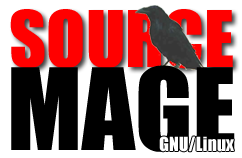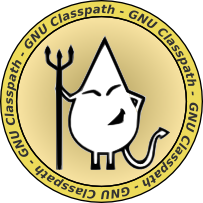Eiffel is an object-oriented programming language designed by Bertrand Meyer and Eiffel Software. Meyer conceived the language in 1985 with the goal of increasing the reliability of commercial software development; the first version becoming available in 1986. In 2005, Eiffel became an ISO-standardized language.

The GNU Compiler Collection (GCC) is an optimizing compiler produced by the GNU Project supporting various programming languages, hardware architectures and operating systems. The Free Software Foundation (FSF) distributes GCC as free software under the GNU General Public License. GCC is a key component of the GNU toolchain and the standard compiler for most projects related to GNU and the Linux kernel. With roughly 15 million lines of code in 2019, GCC is one of the biggest free programs in existence. It has played an important role in the growth of free software, as both a tool and an example.

The GNU Lesser General Public License (LGPL) is a free-software license published by the Free Software Foundation (FSF). The license allows developers and companies to use and integrate a software component released under the LGPL into their own software without being required by the terms of a strong copyleft license to release the source code of their own components. However, any developer who modifies an LGPL-covered component is required to make their modified version available under the same LGPL license. For proprietary software, code under the LGPL is usually used in the form of a shared library, so that there is a clear separation between the proprietary and LGPL components. The LGPL is primarily used for software libraries, although it is also used by some stand-alone applications.
Sather is an object-oriented programming language. It originated circa 1990 at the International Computer Science Institute (ICSI) at the University of California, Berkeley, developed by an international team led by Steve Omohundro. It supports garbage collection and generics by subtypes.

Liberty BASIC (LB) is a commercial computer programming language and integrated development environment (IDE). It has an interpreter, developed in Smalltalk, which recognizes its own dialect of the BASIC programming language. It runs on 16- and 32-bit Windows and OS/2.

Source Mage is a Linux distribution. As a package is being installed, its source code is automatically downloaded, compiled, and installed. Source Mage is descended from Sorcerer.
The GNU Compiler for Java (GCJ) is a discontinued free compiler for the Java programming language. It was part of the GNU Compiler Collection.
A compiled language is a programming language whose implementations are typically compilers, and not interpreters.

wxWidgets is a widget toolkit and tools library for creating graphical user interfaces (GUIs) for cross-platform applications. wxWidgets enables a program's GUI code to compile and run on several computer platforms with minimal or no code changes. A wide choice of compilers and other tools to use with wxWidgets facilitates development of sophisticated applications. wxWidgets supports a comprehensive range of popular operating systems and graphical libraries, both proprietary and free, and is widely deployed in prominent organizations.

The National Institute for Research in Digital Science and Technology (Inria) is a French national research institution focusing on computer science and applied mathematics. It was created under the name French Institute for Research in Computer Science and Automation (IRIA) in 1967 at Rocquencourt near Paris, part of Plan Calcul. Its first site was the historical premises of SHAPE, which is still used as Inria's main headquarters. In 1980, IRIA became INRIA. Since 2011, it has been styled Inria.
MinGW, formerly mingw32, is a free and open source software development environment to create Microsoft Windows applications.

GNU Classpath is a free software implementation of the standard class library for the Java programming language. Most classes from J2SE 1.4 and 5.0 are implemented. Classpath can thus be used to run Java-based applications. GNU Classpath is a part of the GNU Project. It was originally developed in parallel with libgcj due to license incompatibilities, but later the two projects merged.
Object Pascal is an extension to the programming language Pascal that provides object-oriented programming (OOP) features such as classes and methods.

LLVM is a set of compiler and toolchain technologies that can be used to develop a frontend for any programming language and a backend for any instruction set architecture. LLVM is designed around a language-independent intermediate representation (IR) that serves as a portable, high-level assembly language that can be optimized with a variety of transformations over multiple passes. The name LLVM originally stood for Low Level Virtual Machine, though the project has expanded and the name is no longer officially an initialism.

GNU Ubiquitous Intelligent Language for Extensions is the preferred extension language system for the GNU Project and features an implementation of the programming language Scheme. Its first version was released in 1993. In addition to large parts of Scheme standards, Guile Scheme includes modularized extensions for many different programming tasks.

Code::Blocks is a free, open-source cross-platform IDE that supports multiple compilers including GCC, Clang and Visual C++. It is developed in C++ using wxWidgets as the GUI toolkit. Using a plugin architecture, its capabilities and features are defined by the provided plugins. Currently, Code::Blocks is oriented towards C, C++, and Fortran. It has a custom build system and optional Make support.
SmartEiffel was the GNU free Eiffel compiler, provided with associated tools, libraries and classes. GNU has continued to support a free license Eiffel via a new project, LibertyEiffel. The compiler translates Eiffel code either to ANSI C or Java bytecode. Hence it can be used to write programs that run on virtually any platform for which an ANSI C compiler or a Java virtual machine exist.

Linux is a family of open-source Unix-like operating systems based on the Linux kernel, an operating system kernel first released on September 17, 1991, by Linus Torvalds. Linux is typically packaged as a Linux distribution (distro), which includes the kernel and supporting system software and libraries, many of which are provided by the GNU Project. Many Linux distributions use the word "Linux" in their name, but the Free Software Foundation uses and recommends the name "GNU/Linux" to emphasize the use and importance of GNU software in many distributions, causing some controversy.

GnuCOBOL is a free implementation of the COBOL programming language. GnuCOBOL is a transcompiler to C which uses a native C compiler. Originally designed by Keisuke Nishida, the lead development was taken up by Roger While. The most recent developments are now led by Simon Sobisch, Ron Norman, Edward Hart, Sergey Kashyrin and many others.











